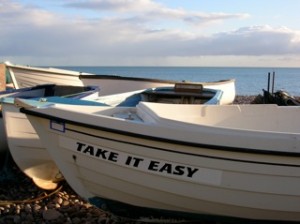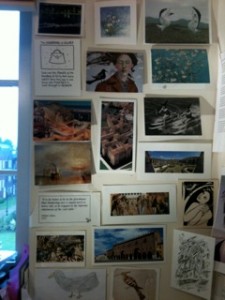 I am in shock. I have finished my writing marathon. All year I’ve had a timetable pinned to the wall beside my desk with weeks blocked out for each book and deadlines marked with ominous dark rings. All year I’ve been holding off the panic that threatened to take over whenever I thought about exactly how many books I was supposed to write.
I am in shock. I have finished my writing marathon. All year I’ve had a timetable pinned to the wall beside my desk with weeks blocked out for each book and deadlines marked with ominous dark rings. All year I’ve been holding off the panic that threatened to take over whenever I thought about exactly how many books I was supposed to write.
And now it’s done. The book that I’d been hatching for months finally had its moment last week, and my subconscious had spent so much time cooking it, that it kind of popped out without the usual ghastly stages of labour that picture books normally take -a lot of gas and air, screaming, cursing, forceps and stitches.
It’s slightly risky to say ‘I’ve done it’ because the last one…a picture book set in Wales in the 1920s and mostly about pigeons (really, it’s better than it sounds) hasn’t yet had the editorial seal of approval, but I’ve tried it out on a few people and it seems to work: so far 80% hit rate of tears by the last page.
Anyway, until I’m told its rubbish and I have to write it again, I can be de mob happy for a while, and do remedial activities like hoover my study floor, an clear away the drifts of notes and notebooks that are on every flat surface in here. Yesterday I wondered why I felt so odd and realised that I had actually relaxed for the first time in months.
But the best thing about this finish line – which isn’t a finish line anyway cos I have another book to do by the end of January – is that my imagination held up under pressure, and I don’t think the quality of the writing has suffered for being part of a brisk production line. That’s a hugely reassuring discovery to have made about myself. The other best thing is that most of what I’ve written this year has been fiction – fiction rooted in fact, but characters and storylines invented to convey facts and truths. Whatever anyone else thinks, I really like the stories I’ve written this year, and I’m so fond of the characters in them: the little boy in my pigeon story, and his relationship with the retired miner, Mr Evans, who contains a little of my own Grandpa and my own father; the girl in my manatee story, who is still paddling about in the flooded forest on the edge of the Amazon in my head; the quiet, steady boy in my elephant story and his naughty younger brother, the dreamy boy from my dancing bear story who loves his bears but wants to be a musician and Michael, my dear brave Whale-Boy; all of them are alive in my head and heart now and as much a part of me as my own real memories.
Another good thing about being temporarily deadline free is that I can do other things. Yesterday I spent an afternoon at the Communities First centre just around the corner from where I live in Abergavenny, signing books and talking to the lovely kids and families that use it, and the dedicated staff and volunteers that run it.
Now if people have heard of Abergavenny it’s usually because of its huge food festival, or because of the wonderful hill walks to be had in the mountains that surround the town. But there’s another side to this little town which has nothing to do with gourmet dinners and glorious landscapes. There is a huge dollop of poverty and deprivation here. There are many families struggling with the destructive effects of generations of unemployment and alienation from education. There are parents trying to be the best parents they can in very difficult circumstances or even without having had a role model of what that looks like. Communities First, which is largely run by volunteers with a few utterly saintly paid staff, provides all manner of help and support to these families. It gives advice on things like housing, money management; it gives training in basic computer skills (pretty soon no one will be able to claim their benefits without being able to use a computer); it runs an after school club to help kids with their homework – vital where mum and dad may not be fluent readers and writers; and its just started up a fantastic book club with the support of the local school and library to encourage year six kids to read. Yesterday, with the help of the local Rotary Club, it was providing children with a toy and a book from Santa’s sack; I’ve seldom seen children so delighted with their gifts or so friendly and well behaved.
Seven thousand people every year are helped, advised, supported, counseled, consoled, educated and cared for by the Center. In human terms, in terms of the common decency by which civilized societies should assess themselves, this work is crucial, helping a marginalised section of the population to feel a bit more included and giving children a chance to break the chain of under achievement. In economic terms it’s a brilliant way to make a small amount of money go a very long way, and prevent much more intractable and expensive problems manifesting themselves in the future. If its funding was trebled then I’d be willing to bet that the cost of crime fighting, health care for chronic ailments associated with poor diet and self neglect, vandalism, drugs, unemployment etc etc etc would drop like a stone round here. Eventually the success of the Center would be such that it would do itself out of a job.
But guess what I’m going to tell you next? The Center is set to close by the end of March next year. The Welsh Assembly has cut its funding. The staff are fighting a valiant rear guard action to keep the office open a few days a week, staffed by one part time worker and a few volunteers, so that the families that they help won’t be utterly abandoned. But with a reduced staff and limited opening times much of the work that the Center does will be left undone. Seven thousand people will be left to muddle through as best they can, trying largely unsuccessfully to undo the tangled knot that long term poverty and alienation has tied them in. In the short term it will balance somebody’s books, but in the long term the costs will escalate like the interest on a pay day loan. The decision to cut the Center’s funding is poor government, that will lead to greatly increased costs in the future and a further accumulation of human misery in a little town that should, and could, be a joyful place for everyone to live. It’s pretty clear that the Welsh Assembly has put communities last in Abergavenny.

